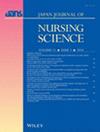Effectiveness of a self-assessment application in evaluating the care coordination competency of intensive care unit nurses in managing patients on life support: An intervention study
Abstract
Aim
To examine the effectiveness of the feedback from the Nurses' Care Coordination Competency Scale (NCCCS) application (app) used for self-assessing the care coordination competency of intensive care unit (ICU) nurses in managing patients on life support.
Methods
A non-randomized open-label study was conducted in Japan from November 2021 to March 2022. Participants were 318 ICU nurses from acute hospitals in Japan. They were divided manually into two groups based on their certification status. The intervention was immediate feedback on the results of the care coordination competency self-assessment through the NCCCS app; the control group performed the NCCCS survey with no feedback. The primary outcome was an increase in the NCCCS score 1 month after the intervention. Mann–Whitney U test was used to compare the scores of the intervention and control groups. Wilcoxon's signed rank sum test was used to compare the scores in the first and second NCCCS surveys.
Results
Forty-one participants were lost to follow-up, leaving 277 participants (intervention = 141, control = 136) for analysis. One month later, NCCCS scores similarly increased in both groups. For nurses with at least 5 years of ICU experience (n = 152), the NCCCS score increased in the intervention group (n = 75) (rising point mean: 4.8, standard deviation [SD]: 9.8) compared with that in the control group (n = 77) (rising point mean: 1.3, SD: 8.3) (p = .048).
Conclusions
Feedback from the NCCCS app can improve care coordination behavior. However, a certain level of ICU experience may be required to translate feedback into improved behavior.


 求助内容:
求助内容: 应助结果提醒方式:
应助结果提醒方式:


